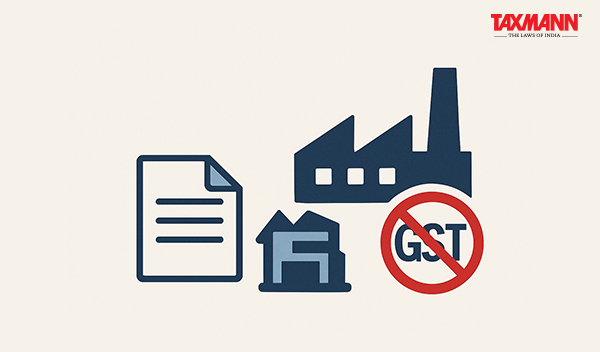Assignment of Leasehold Industrial Plot Not Liable to GST | HC
- Blog|News|GST & Customs|
- 2 Min Read
- By Taxmann
- |
- Last Updated on 7 May, 2025

Case Details: Time Technoplast Ltd. vs. Union of India - [2025] 173 taxmann.com 868 (Gujarat)
Judiciary and Counsel Details
- Bhargav D. Karia & D.N. Ray, JJ.
-
Hardik V. Vora, Adv., for the Petitioner.
-
Ms Shrunjal Shah, AGP & Ankit Shah, Adv. for the Respondent.
Facts of the Case
The petitioner, a company, was originally allotted an industrial plot by the Gujarat Industrial Development Corporation (GIDC) on leasehold basis for its industrial use. The allotment conferred leasehold rights over the land and the building constructed thereon in favour of the petitioner, in accordance with the terms and conditions prescribed by GIDC. Subsequently, the petitioner, having obtained full leasehold rights, entered into a Deed of Assignment, whereby the entire interest in the said plot, including the leasehold rights, was transferred to its wholly-owned subsidiary. The transfer was executed for full and adequate consideration, duly reflected in the deed.
Pursuant to this transaction, the jurisdictional GST authority issued a show cause notice under section 74 of the CGST Act proposing to demand GST on the transfer fee received by the petitioner. The notice alleged that the said transaction amounted to a ‘supply’ within the meaning of section 7(1)(a) of the CGST Act, and attracted GST under section 9. The notice specifically relied on clause 5(b) of Schedule II, asserting that the transaction amounted to a lease or letting of land and building, classifiable as a supply of services. The authority also invoked clause 5 of Schedule III in conjunction with clause 5(b) of Schedule II to contend that the transaction did not qualify as a sale of land or building, and hence did not fall within the exclusions under Schedule III, rendering it liable to GST.
Aggrieved by the issuance of the show cause notice, the petitioner approached the Gujarat High Court by filing a writ petition, seeking quashing of the said notice on the ground that the transaction was a mere transfer of immovable property and fell outside the scope of GST.
High Court Held
The Hon’ble Gujarat High Court held that the transaction involving the assignment of leasehold rights in the industrial plot and building by the assessee to its subsidiary amounted to a complete transfer of immovable property and could not be treated as a ‘supply’ under section 7(1)(a) of the CGST Act. The Court observed that the Deed of Assignment executed between the parties evidenced a one-time, absolute transfer of leasehold rights for valuable consideration and did not constitute a service of leasing or renting as contemplated under clause 5(b) of Schedule II.
Furthermore, the Court clarified that clause 5 of Schedule III, which excludes certain transactions from the scope of supply, was inapplicable in the instant case. Accordingly, impugned show cause notice was to be set aside.
List of Cases Reviewed
- Gujarat Chamber of Commerce and Industry v. Union of India [2025] 170 taxmann.com 251 (Guj.)
- Alfa Tools Pvt. Ltd. v. Union of India & Anr., 2025:GUJHC;15785-C, followed
List of Cases Referred to
- Gujarat Chamber of Commerce and Industry v. Union of India [2025] 170 taxmann.com 251/94 GSTL 113 (Gujarat) (para 4).
Disclaimer: The content/information published on the website is only for general information of the user and shall not be construed as legal advice. While the Taxmann has exercised reasonable efforts to ensure the veracity of information/content published, Taxmann shall be under no liability in any manner whatsoever for incorrect information, if any.

Taxmann Publications has a dedicated in-house Research & Editorial Team. This team consists of a team of Chartered Accountants, Company Secretaries, and Lawyers. This team works under the guidance and supervision of editor-in-chief Mr Rakesh Bhargava.
The Research and Editorial Team is responsible for developing reliable and accurate content for the readers. The team follows the six-sigma approach to achieve the benchmark of zero error in its publications and research platforms. The team ensures that the following publication guidelines are thoroughly followed while developing the content:
- The statutory material is obtained only from the authorized and reliable sources
- All the latest developments in the judicial and legislative fields are covered
- Prepare the analytical write-ups on current, controversial, and important issues to help the readers to understand the concept and its implications
- Every content published by Taxmann is complete, accurate and lucid
- All evidence-based statements are supported with proper reference to Section, Circular No., Notification No. or citations
- The golden rules of grammar, style and consistency are thoroughly followed
- Font and size that’s easy to read and remain consistent across all imprint and digital publications are applied



 CA | CS | CMA
CA | CS | CMA
